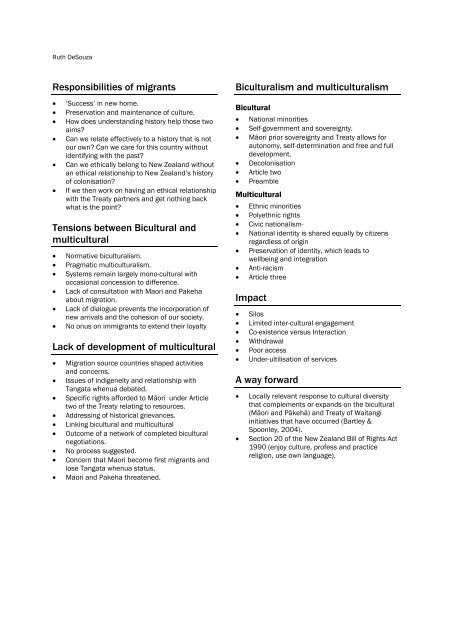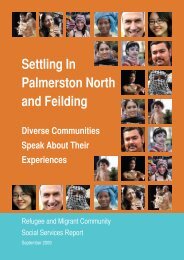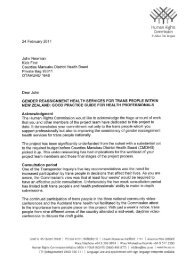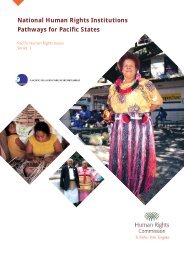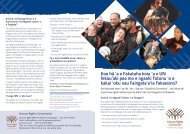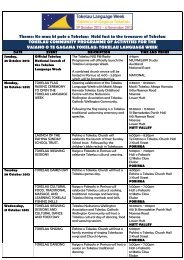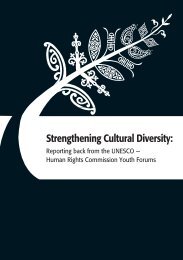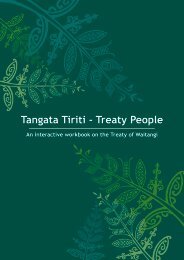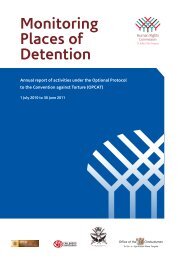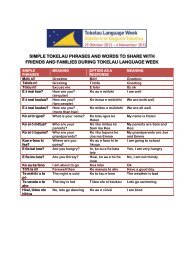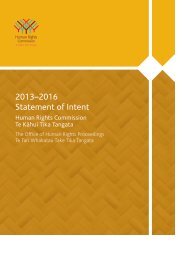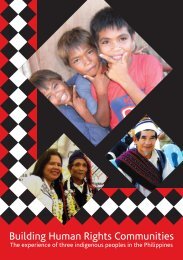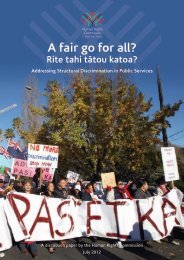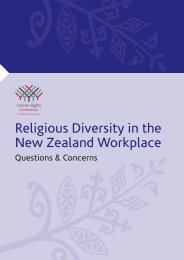Across the Post-Colonial Divide: Reflections on the Treaty of Waitangi
Across the Post-Colonial Divide: Reflections on the Treaty of Waitangi
Across the Post-Colonial Divide: Reflections on the Treaty of Waitangi
Create successful ePaper yourself
Turn your PDF publications into a flip-book with our unique Google optimized e-Paper software.
Ruth DeSouza<br />
Resp<strong>on</strong>sibilities <strong>of</strong> migrants<br />
• ‘Success’ in new home.<br />
• Preservati<strong>on</strong> and maintenance <strong>of</strong> culture.<br />
• How does understanding history help those two<br />
aims<br />
• Can we relate effectively to a history that is not<br />
our own Can we care for this country without<br />
identifying with <str<strong>on</strong>g>the</str<strong>on</strong>g> past<br />
• Can we ethically bel<strong>on</strong>g to New Zealand without<br />
an ethical relati<strong>on</strong>ship to New Zealand’s history<br />
<strong>of</strong> col<strong>on</strong>isati<strong>on</strong><br />
• If we <str<strong>on</strong>g>the</str<strong>on</strong>g>n work <strong>on</strong> having an ethical relati<strong>on</strong>ship<br />
with <str<strong>on</strong>g>the</str<strong>on</strong>g> <strong>Treaty</strong> partners and get nothing back<br />
what is <str<strong>on</strong>g>the</str<strong>on</strong>g> point<br />
Tensi<strong>on</strong>s between Bicultural and<br />
multicultural<br />
• Normative biculturalism.<br />
• Pragmatic multiculturalism.<br />
• Systems remain largely m<strong>on</strong>o-cultural with<br />
occasi<strong>on</strong>al c<strong>on</strong>cessi<strong>on</strong> to difference.<br />
• Lack <strong>of</strong> c<strong>on</strong>sultati<strong>on</strong> with Maori and Pakeha<br />
about migrati<strong>on</strong>.<br />
• Lack <strong>of</strong> dialogue prevents <str<strong>on</strong>g>the</str<strong>on</strong>g> incorporati<strong>on</strong> <strong>of</strong><br />
new arrivals and <str<strong>on</strong>g>the</str<strong>on</strong>g> cohesi<strong>on</strong> <strong>of</strong> our society.<br />
• No <strong>on</strong>us <strong>on</strong> immigrants to extend <str<strong>on</strong>g>the</str<strong>on</strong>g>ir loyalty<br />
Lack <strong>of</strong> development <strong>of</strong> multicultural<br />
• Migrati<strong>on</strong> source countries shaped activities<br />
and c<strong>on</strong>cerns.<br />
• Issues <strong>of</strong> indigeneity and relati<strong>on</strong>ship with<br />
Tangata whenua debated.<br />
• Specific rights afforded to Māori under Article<br />
two <strong>of</strong> <str<strong>on</strong>g>the</str<strong>on</strong>g> <strong>Treaty</strong> relating to resources.<br />
• Addressing <strong>of</strong> historical grievances.<br />
• Linking bicultural and multicultural<br />
• Outcome <strong>of</strong> a network <strong>of</strong> completed bicultural<br />
negotiati<strong>on</strong>s.<br />
• No process suggested.<br />
• C<strong>on</strong>cern that Maori become first migrants and<br />
lose Tangata whenua status.<br />
• Maori and Pakeha threatened.<br />
Biculturalism and multiculturalism<br />
Bicultural<br />
• Nati<strong>on</strong>al minorities<br />
• Self-government and sovereignty.<br />
• Māori prior sovereignty and <strong>Treaty</strong> allows for<br />
aut<strong>on</strong>omy, self-determinati<strong>on</strong> and free and full<br />
development.<br />
• Decol<strong>on</strong>isati<strong>on</strong><br />
• Article two<br />
• Preamble<br />
Multicultural<br />
• Ethnic minorities<br />
• Polyethnic rights<br />
• Civic nati<strong>on</strong>alism-<br />
• Nati<strong>on</strong>al identity is shared equally by citizens<br />
regardless <strong>of</strong> origin<br />
• Preservati<strong>on</strong> <strong>of</strong> identity, which leads to<br />
wellbeing and integrati<strong>on</strong><br />
• Anti-racism<br />
• Article three<br />
Impact<br />
• Silos<br />
• Limited inter-cultural engagement<br />
• Co-existence versus Interacti<strong>on</strong><br />
• Withdrawal<br />
• Poor access<br />
• Under-ultilisati<strong>on</strong> <strong>of</strong> services<br />
A way forward<br />
• Locally relevant resp<strong>on</strong>se to cultural diversity<br />
that complements or expands <strong>on</strong> <str<strong>on</strong>g>the</str<strong>on</strong>g> bicultural<br />
(Māori and Pākehā) and <strong>Treaty</strong> <strong>of</strong> <strong>Waitangi</strong><br />
initiatives that have occurred (Bartley &<br />
Spo<strong>on</strong>ley, 2004).<br />
• Secti<strong>on</strong> 20 <strong>of</strong> <str<strong>on</strong>g>the</str<strong>on</strong>g> New Zealand Bill <strong>of</strong> Rights Act<br />
1990 (enjoy culture, pr<strong>of</strong>ess and practice<br />
religi<strong>on</strong>, use own language).


